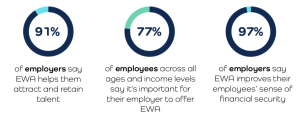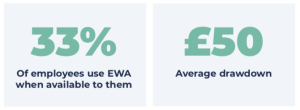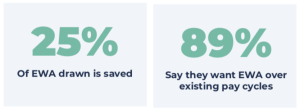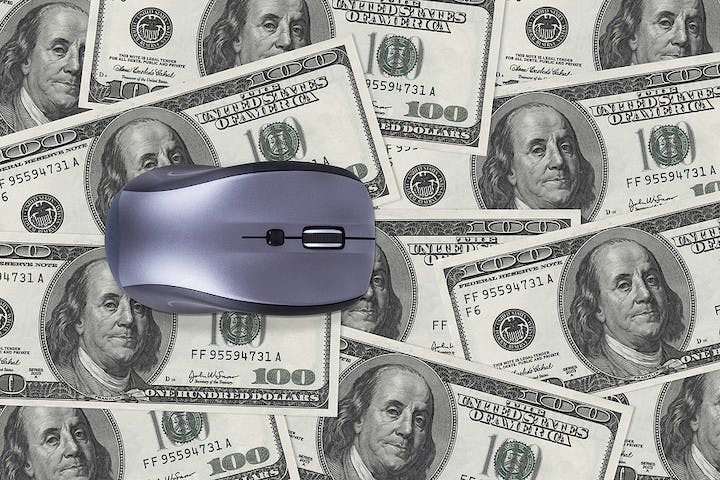Last month it was being reported that American workers are amongst the most financially astute on the planet – scoring higher than their peers in the Europe and the UK for that all-important sense of financial wellness.
Workers in the United States, claimed nudge’s ‘Global Financial Wellness Survey’ have an overall financial health score of 62/100 and an average financial saving score of 64/100. The latter is 10 points higher than the global average saving score (54/100).
The reason, purported the researchers, was one simple fact: America’s long-established history of not providing the sorts of state-funded financial ‘safety nets’ that other nations/continents provide. In short, Americans grow up knowing there’s no plan B. They need to look after themselves.
But none of this can hide the fact that recent times (read ‘living costs’) have recently been hard.
Americans have been forced into demonstrating new financial behaviors – those where, just to keep the roof over their heads, they’ve been steadily eating into their savings, creating real financial peril for some.
Data from US Bureau of Economic Analysis has found that last year, people’s personal savings rate (how much people save as a percentage of their disposable income), fell to a low of 3.9% (down from the decade-long average of 8.9%).
In fact overall, some 60% of Americans are living from ‘pay-check to pay-check’ according to a recent LendingCLub report – but this rises to 76% amongst those earning less than $50,000 a year and 62% of those earning between $50,000 and $100,000.
CNBC’s recent Your Money Financial Confidence Survey also found 70% of Americans are now stressed about their finances, with only 45% saying they have any sort of emergency fund, and 26% of workers polled claiming they have less the $5,000 in savings.
Demand for earned wage access
With financial stress now regarded as having the single-most corrosive impact on overall wellness, the HR implications of all this are massive.
In much of Europe it’s driving incerasing demand (and provision) of what’s known as earned-wage-access (or EWA).
EWA is a benefit that gives employees access to the wages they’ve already earned.
Say, for example, it’s the middle of the month, and the car breaks down, or the heating system goes bust, creating an unexpected cost.
This perk allows staff to access a proportion of the money they’ve already earned, to pay for this sudden cost, rather than be forced to wait till the end of the month, when they might have gone into arrears.
Awareness of the existence of EWA is starting to create huge employee demand for it. In 2022, ADP found 76% of US employees would want their employer to offer it, but (while growing), it is still not mainstream, owing to a number of key concerns – notably fears that employees will mismanage their early access, and get into further debt, and general uneasiness about effectively loaning staff their wages early.

But should CHRO’s reconsider their preconceptions about offering it – especially if it helps (as data also shows) to retain talent?
To find out more, TLNT exclusively interviewed Borja Perez, VP at one such provider, CloudPay:
Q: EWA is proving to be a popular benefit to offer workers in the UK, and stats show US workers want it too. Why do you see demand for EWA growing?
Q: “It comes down to a combination of employee expectations and the rise of the gig economy. People are used to instant gratification in so many aspects of their lives, and they expect the same with their pay. Instead of waiting for payday, employees want immediate access to the wages they’ve earned. Reports show 61% of Gen Zers would like their employer to provide the option for daily pay. And both millennials and Gen Zers believe they deserve instant access to wages they’ve earned. The gig economy has also propelled adoption of EWA. Those working in the gig economy typically have, and want, the ability to cash out their earnings immediately after completing a shift. New digital banking and payments solutions make this possible. There’s no need to go to a bank branch and open an account in order to get paid. Wages can get dispersed directly to an account or pay card and can be accessed through a mobile app.”
Q: The research also suggest it’s not very common yet in the US. Why do you think this is?
A: “The main reason is a lack of knowledge about what earned wage access really means. EWA is not a payroll advance or a loan. It can typically be offered as a 100% employer sponsored benefit that gives employees access to the wages they’ve worked for. It’s not a payroll advance. But there’s also concern about EWA legislation. States such as California and Connecticut are working to classify earned wage access as a loan, while others simply want to require state licensing for providers to protect consumers. But a nation full of disparate regulations will only complicate employers’ and employees’ ability to take advantage of this essential benefit. We advocate for legislation that aligns with the Consumer Federal Protection Bureau’s Advisory Opinion Policy.”
Q: Is the part of the problem with EWA that employers don’t really want to get themselves involved too heavily in their employees’ personal finances (Or is it simply the fact that they can’t avoid getting involved now)?
A: “It’s neither! EWA actually gives employees complete control of their wages. If they have a need or unexpected expense, they don’t have to ask their employer for a pay advance or have a difficult conversation with HR to disclose their financial hardship. They simply access the funds available to them through EWA.”
Q: EWA supporters claim it helps make people more financially stable, but detractors argue its a sticking plaster, because it allows people to access money too soon, which will leave them short the next month. Aren’t employers better off offering financial planning training, rather than giving them money?
A: “Data tends to show employees are not emptying their accounts. Instead, they are taking only what they need, when they need it. Employers are also in full control of how wages are made available. Limits can be set by both the employer and the employee for a maximum percentage or amount of earnings that can be withdrawn at any time. Limits can also be set for number of withdrawals within a period of time. But this has never been an issue with any of our clients. It is important to supplement EWA with financial education though.”
Q: Do you have stats on the amounts people typically want to access before the official pay-day? What do these amounts tell us about the benefit?
A: Our own customer data shows withdrawal amounts are between $85-$135 and employees make 2-5 withdrawals per month, suggesting they simply use on-demand pay to manage their daily expenses. Employers also have visibility into why employees are requesting EWA. Users are not obligated to disclose why they are accessing funds, but for those who answer, employers can track trends and reasons. That data could potentially help organizations develop benefits to meet employees’ greatest financial needs.”
Q: Who typically accesses EWA? (Data from the UK suggests it’s by people in their 30s-40s, not younger generations as expected).
A: “In the past six months, our data shows withdrawals were made from employees ranging from 20-53 years. Of these EWA users, 48% were male and 52% were female. The EWA app user breakdown includes the following: Millennials – 41%; Gen X – 14%; Gen Z – 42%. People across all salary bands take advantage, but data shows those who make less than $30k are using it the most.”
Q: Isn’t EWA going to create the impression that people can get their money early, rather than properly budget till the end of the month?
A: “Younger generations have an expectation to manage their money that’s reflective of their instant, on-demand way of life. With EWA employees don’t have to spend days liaising with their HR team to ask them to set up a transfer or add another savings account.”
Q: US personal debt is already $1 trillion – will this help?
A:“Yes! More than half of Americans are now living paycheck to paycheck. And 70% say they feel stressed about finances. EWA allows workers to leverage their wages as unexpected needs arise. It is an option employees can turn to instead of going into credit card debt or stressing about paying back a loan with a high interest rate. People go into debt when they don’t have access to cash, and EWA provides access to that.
What will also help is financial wellness education on top of EWA. Employers that offer financial wellness programs typically have a more motivated, productive, and less stressed workforce. Improved retention and productivity rates can lead to a reduction in the number of days employees take off for stress-related issues. Better financial knowledge can also lead to improved decision-making. Financial education can be delivered directly though the EWA app in the form of articles, videos, and courses.”
Q: What’s the likelihood more US firms will offer it?
A: “It’s not if US firms will offer it, it’s when. We see EWA becoming the industry standard. Early EWA adopters are already seeing the benefits of reduced talent acquisition and retention costs. In the very near future, EWA will become the expectation of employees and a top attraction tool for employers. EWA is a competitive advantage that increases brand awareness, drives talent acquisition, increases productivity, and reduces absenteeism. In our experience, and in the experience of our customers, this benefit has a significant positive business impact. The fact that every customer that has implemented our offering is still offering it today is significant. We also anticipate employers will move from using multiple EWA vendors that only operate in specific countries to a single vendor that can offer payments in every country where the company employs workers.”
Comparison: How EWA is used in the UK:
According to incomegroup’s latest Q4 2023 data:



